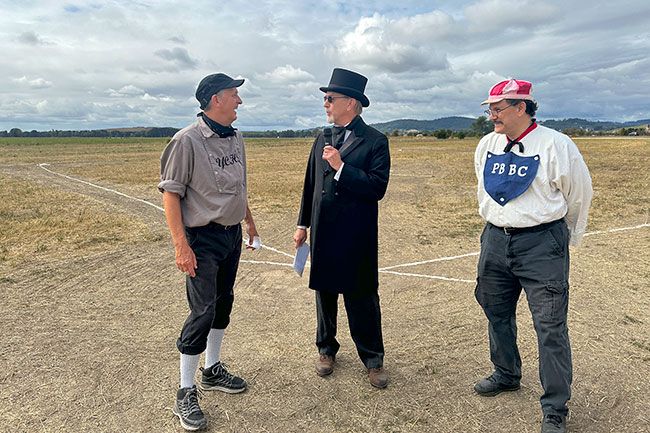Letter to Readers: ‘Huzzah’ to McMinnville’s Vintage Base Ball tradition

Picture the scene: haybales for a backstop and cowbell for tolling each “ace,” with 1860s brass band music in the background. Strikers wield thick heavy bats and run between cloth sacks guarded by base-ists.
If you missed the annual Vintage Base Ball game between McMinnville Gristmillers against visiting Portland Pioneers, there is always the second Saturday of September 2025.
The entire affair is an annual tradition hosted by the Yamhill County Historical Society on the grounds of the Durham Road museum. I played in the game for the third time, and highly recommend the experience, for players and spectators alike.
Before proceeding, a small glossary is in order, for this is 1860s base ball terminology: an ace is a run scored; a hand is the old term for an out; a striker is the batter, who tries to hit a ball thrown by the hurler, aka pitcher. Also, a key point on rules: the fielders, or base-ists, wear no gloves. On the west side of the haybales, this is 1868.
Then there are the players’ chosen (or assigned) names.
Tin Man, Maverick, Wizard, Biscuits and Gravy, Gabby, Duh-Duh and Anvil, to name a few — all whimsical or evocative of another time. The umpire, aka arbiter, was Rev. Jackson Rabbit (aka Michael Panhorst) decked out in official-looking long coat and top hat.
The field had been planted with grain, then harvested and the ground graded and lined, just as would have been done in the 19th century as town teams made their way to each others’ diamonds.
Players rode in a wagon towed by a YCHS-owned steam engine, and waved and yelled “Huzzah!” (Though the modern “hooray” is also accepted.) Uniforms are partly improvised to resemble kits from 150 years ago, but both teams sport replica hats and tunics with insignia bibs. Our able catcher, Gunner, rocked the black bowler as he scoops up grounders and foul balls.
One of the best parts of the whole day was the size, and spirit, of the crowd. No tickets are sold so it’s hard to compare the “gate” to past years, but it was one of the best-attended games in Vintage’s 10-year history. Organizing it all is manager Dave “Stretch” Rucker and other YCHS volunteers and staff. Announcers John Olson and Soren Smithrud added enjoyable commentary and kept the audience informed along the way on lineups, field substitutions, and rules.
Did I mention the weather was mid-70s base ball perfect, with a cloud backdrop to rival Wrigley or Fenway? It looked like a Big White Wall beyond the outfield -- or “garden,” as John Olson called it. This helped exude base ball as “the 19th century pastoral game,” as George Carlin called it.
(“Baseball is played in a park … the object is go home, to be safe at home.”)
Accompanying the steam engine entry, and the whole game, was the Whiskey Flats Band out of the Columbia Gorge; I’m friends with members of the band and helped manager “Stretch” Rucker arrange for them to come down and play brass tunes of the late 19th century.
Harmony was on the field, too. “This is a gentleman’s game,” it had been noted, and there was this year an absence of rancor. (That said, “cranks” or good-natured hecklers, are encouraged in Vintage – just be prepared to pay the arbiter 25 cents for anything resembling salty language.)
Indeed, on Sept. 14 true sportsmanship prevailed, as on more than one occasion Rev. Rabbit left it up to the striker and base-ist to determine whether or not the play was a “hand.”
The Pioneer pitcher moved up close to pitch to striker Hiram “The Judge” Geary, 8, and then let the pop fly drop and The Judge reach base.
It was Tiny, the 6-7 treetrunk-shaped outfielder for the Pioneers who corrected all concerned after one inning, reminding us that we Gristmillers had just completed our third hand of the inning. We stayed on the field as if it was two, and he reminded us of a fine outfield catch earlier in the inning.
Bare-handed, not bareknuckled. That is another bygone sport, best gone.
News-Register Managing Editor Kirby Neumann-Rea can be reached at kirby@newsregister.com or 503-687-1291.












Comments